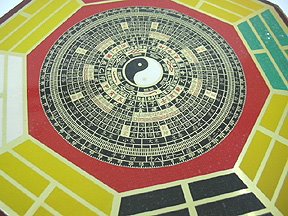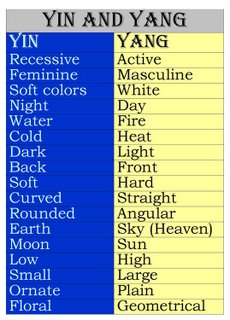In Feng Shui, the windows of your house are the eyes of your home.
The doors are the "mouths". Windows allow you to look out, and breathe in Chi, or vital energy. Windows also let in the welcome warmth and sunshine - the Yang Chi.
If you have a room that has too much yin and is dark, foreboding, and depressing, install an extra window if possible, or make an existing window opening larger. If renovations to your windows are not possible, you can paint the room a sunlight yellow or hang a mirror opposite a window to "create" another window. Other enlivening elements include bright colors, lights, crystals, flowers and plants. Wherever possible have two windows that open in each room. From a practical point of view, this creates cross ventilation and a more even distribution of light and Chi.
Privacy is vital to a sense of well being. Make sure that your window coverings, plants or ornaments screen the inside of your home. If "poison arrows" of negative Sha Chi are aiming towards your house - such as pointy rooftops, corners of buildings, etc - it is best to place a plant, vase or statue on your windowsill to help prevent the negative Sha Chi from entering. The very best cure is an octagonal Bagua Mirror which will bounce the negative energy away from your home.
A good view is even better Feng Shui. It not only serves to increase the value of a property but brings about Sheng Chi (the most auspicious Chi). If you have a blank wall outside of your windows, this will generate negative Sha Chi. Plant some colorful flowers, creeping vines, or shrubbery. Install window boxes and fill them with cheery flowers. Spring for pretty curtains, and other smart decorating details which can detract from even the most gloomy outlook. You might consider install "faux" stained glass windows (decorative window film from Home Depot - $19.97) to block an ugly view. They not only let light in, they are colorful and gorgeous.
Your windows are your outlook on life.
Your doors, on the other hand, are the "mouths" of your home.
There is generally a suggested ratio of "eyes" to "mouths" (windows to doors). If you think about it, you certainly wouldn't want to have 5 mouths to every pair of eyes! This would mean that the occupants of the house would constantly be bickering, yelling, and fighting. Do a quick count and see what you're working with.
Go outside to the street and make your way towards your door. Is it easy to find or do you have to meander around the side of the house looking for it? Does it feel safe? Is it well lit at night? Does it look appealing or scary? Does the door look happy or tired? Is it greeting people, or is it saying "Go away," or "I’ve got something to hide," or "My owner doesn’t care about me."
Here are some quick tips for creating a great "mouth" for your house:
Moving objects (flags, whirligigs, etc.), sounds (chimes) and color (fresh coat of paint or colorful flowers) can easily attract people and chi toward a door. Shiny objects can catch the eye of guests too. A fountain outside the door is the ultimate. Face it - everyone's #1 gripe is not being able to see house numbers at night!
A red door (I suggest "Heritage Red" by Benjamin Moore - a classic beauty) can be used to welcome guests. Believe it or not, homes with red doors get broken into much less often than homes without red doors. A red door says "My owner cares about me - so watch out!".
Bonus House Tip of the Month:
Check ALL doors for squeaks, and stickiness. Use WD40 to banish squeaks and sand down sticky doors as necessary. Don’t forget closet and cabinet doors! Anything that doesn't work in your home represents your life not working. Don't let these things go!
To get a free estimate on a full-blown Feng Shui Consultation, visit our website, Feng Shui Style.
Tips, tricks, and all the latest on Feng Shui, by Jennifer A. Emmer, owner of Feng Shui Style in the Bay Area. Our corporate office is in downtown San Jose, California.
Showing posts with label yang chi. Show all posts
Showing posts with label yang chi. Show all posts
Tuesday, December 08, 2009
Thursday, October 18, 2007
The Chinese Compass (Luo Pan)
 About 1,600 years ago, the Chinese had already determined that there were invisible forces at work beneath the earth. These were later confirmed to be magnetic forces. The Chinese believed these forces were positive (Yang) and negative (Yin) and developed a luopan compass to measure them.
About 1,600 years ago, the Chinese had already determined that there were invisible forces at work beneath the earth. These were later confirmed to be magnetic forces. The Chinese believed these forces were positive (Yang) and negative (Yin) and developed a luopan compass to measure them.Luo means a net that encompasses everything and Pan means utensil or plate. This allegorically refers to the union of Heaven and Earth and specifically to the electro magnetic field that holds all matter together.
Ancient China gave the world several of the mathematical and scientific concepts we take for granted today, such as the compass. The magnetic compass was invented in China for use by Feng Shui practitioners. It was adapted from the "south pointing spoon," or Si Nan. Because of variations over time in the earth's magnetic fields, three compass systems were superimposed over each other during the span of half a millennium to establish the compass that Feng Shui practitioners use today.
The original magnetic compass used for navigation was constructed in the seventh or eighth century with the needle floating in water. The true north-south meridian was first set down by Chiu Yun Han (c. 713 - 741 A. D.) and known as the Cheng Chen. This was used until roughly 880, when readings were so far off the mark that immediate correction was required. In the eight or ninth century it was further refined with the discovery of magnetic declination.
Yang Yun Sang added specialized compass points to compensate for the variation. The Feng Chen or "seam needle" fixed the Cheng Chen's variations. The compass was again adjusted in the 1100s when Lai Wen-Chun came up with the Chung Chen (the central needle). Chinese people used compasses for centuries prior to even the most rudimentary ones on European ships. As late as the seventeenth century, all Western compasses still pointed south just like the ancient south-pointing spoons they were built to imitate.
During the Cultural Revolution (1966-1969), the old ways came under scrutiny once more. While traditional medicine received official sanction from the government, Feng Shui did not. It was eventually outlawed. Ironically, since many Chinese leaders owed their rise to power to Feng Shui, they purposely kept Feng Shui texts hidden from the masses. Today, what little Feng Shui survives in China is under strict control of the Communist government.
Get a Feng Shui Consultation today for your home or office at Feng Shui Style.
Wednesday, August 15, 2007
In Summation: Yin and Yang
 The Chinese believed that there were energy forces (Chi) in the body as well as the universe. They believed that there must be a balance between the Yin and Yang aspects of this energy in the body, for perfect health, and in the earth, for growth. Feng Shui is the art of detecting the Chi in a room, building, or site, and regulating it for results. The benefits of Feng Shui were once restricted only to the rich and powerful in China, but are now becoming widely available. Simply put, proper Feng Shui will make you feel fabulous in your home or office. It's largely common sense.
The Chinese believed that there were energy forces (Chi) in the body as well as the universe. They believed that there must be a balance between the Yin and Yang aspects of this energy in the body, for perfect health, and in the earth, for growth. Feng Shui is the art of detecting the Chi in a room, building, or site, and regulating it for results. The benefits of Feng Shui were once restricted only to the rich and powerful in China, but are now becoming widely available. Simply put, proper Feng Shui will make you feel fabulous in your home or office. It's largely common sense.For example, it just feels better to have your back to a wall and see the door in your office. To have your back to the door, you tend to feel anxious that someone will sneak up on you. This makes you less productive. This is also why in a restaurant, men prefer to take the seat against the wall, looking out, with a view of the widest expanse of the room. They instinctually feel more able to protect their partners in this position. They are also safe from attack, which undoubtedly hearkens back to hunting and gathering days.
Feng Shui intuition runs very deep, and we all feel it. Knowing how to manipulate it is another matter. It is about taking care of a myriad of rules and details like this, in your home or office, which all add up. The overall effect can be improved dramatically by using these rules to adjust your furniture, objects, colors and materials. Once you learn about Feng Shui, you will never see the world the same way again.
Get a Feng Shui Consultation today for your home or office at Feng Shui Style.
Subscribe to:
Posts (Atom)

